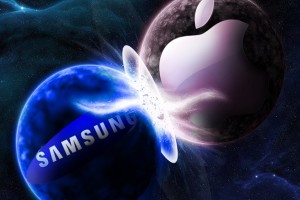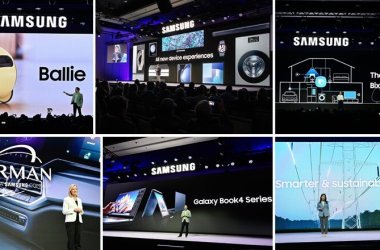 Samsung should pay more than $2 billion for repeated infringement of Apple patents in more than 37 million smartphones sold in the U.S., a Silicon Valley jury was told Tuesday as a trial between the two companies began after more than two years of preparation.
Samsung should pay more than $2 billion for repeated infringement of Apple patents in more than 37 million smartphones sold in the U.S., a Silicon Valley jury was told Tuesday as a trial between the two companies began after more than two years of preparation.
Apple opened its case by declaring, “the reason the damages are high is because the scope of Samsung’s infringement is massive,” but Samsung hit back soon after, telling the jury that the Apple figure was “a gross, gross exaggeration and an insult to your intelligence.”
Samsung is accused of infringing five Apple patents related to smartphone functions, including the slide-to-unlock feature that prevents accidental use; word correction when typing; contextual links with contact information; universal search of the phone and Internet; and background syncing of data. Apple is accused of infringing two Samsung patents, including one on remote video transmission and one on digital imaging.
The case follows a similar high-profile patent infringement lawsuit in the same court that concluded earlier this year with two juries awarding Apple $929 million in damages.
While the patents and phones are different in this case, the trial began in much the same way as before, with Harold McElhinny, a lawyer for Apple, asking jurors: “Where were you on Jan. 9, 2007?”
Jurors were shown a video of the iPhone’s introduction at Macworld Expo 2007, where Steve Jobs demonstrated at least one of the features under contention in this case: the slide-to-unlock function that prevents accidental pocket dialing.
“Once the iPhone went on sale, Samsung pretty quickly realised two things,” said McElhinny. “The iPhone was taking the world by storm, consumers loved it, iPhones followed by iPads were literally flying off shelves. The other recognition was that it simply didn’t have a product that could compete.”
Apple’s case relies heavily, just as it did last time, on internal Samsung documents that lawyers were able to obtain once the lawsuit was filed. In many of the documents shown in court Tuesday, Samsung designers repeatedly referenced the iPhone when discussing features in their own handsets.
In one Samsung document, labelled a user interface road map, Samsung appears to have cut-and-pasted a graphic from an Apple website when proposing a system that would recognise things like phone numbers and email addresses, and offer users a contextual menu, which is another of the technologies at the centre of the case.
Lawyers for Samsung had their own internal documents from Apple, including a 2010 email from Jobs that mentioned a “2011 Holy War” against Android and noted areas where Apple was falling behind Android, including speech, tethering and cloud syncing of user data.
“Apple is in danger of hanging on to the old paradigm too long,” Jobs wrote in the email ahead of an internal meeting of Apple’s top 100 employees.
Samsung said the patent infringement argument is flawed, that Google and not Samsung came up with some of the technology and that, even if its charges are valid, Apple’s claim of around $40 per phone in royalties is unreasonable.
John Quinn, a lawyer for Samsung, told jurors the case is really about the success of Android and brought up one of the accused phones, the Samsung Galaxy Nexus, as an example. The Nexus, unlike most Samsung phones, was based entirely on Google Android software with no enhancements from Samsung.
While Samsung is the defendant in the case, the outcome could have a further reach.
Some of the functions are widely used in Android phones, so an Apple victory could force changes to Google’s Android operating system or give Apple a launchpad for further lawsuits.
At a higher level, the case and others like it have highlighted what many feel are problems with the U.S. patent system. Many feel that patents issued in recent years are often too broad or are being abused by holders to block competitors from entering a market.
These cases have resulted in a redirection of corporate investment with major companies spending more money on litigation, said Cheryl Milone, Chairman and Founder of Article One Partners, an online patent validation community.
“While worldwide brands and small companies alike view their own companies’ patents as having a high quality level, there is a widespread belief that there are many low quality patents causing a thicket,” she said. “This further impacts innovation as meritorious advancements are buried in this thicket and the public has to pay monopoly pricing and the costs to the public of litigation.”
The jury is expected to hear the case over Mondays, Tuesdays and Fridays for the rest of April, after which deliberations will begin. Originally made up of 10 people, the jury shrunk to eight as the trial began due to the sickness of one juror and a hardship for another.
The case is 12-00630, Apple v. Samsung Electronics et al, in the U.S. District Court for the Northern District of California in San Jose.





